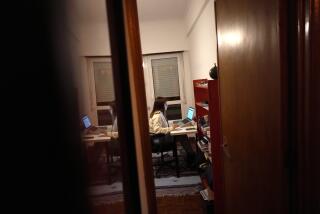MIT study suggests telecommuters less likely to be promoted
- Share via
The comfort of working at home might have serious drawbacks for telecommuters hoping for the big promotion.
A new study from the MIT Sloan Management Review suggests the benefits of being seen at work can dramatically improve your chances of advancement. The study describes two types of “passive face time” that it says heavily influence manager’s decisions.
“Expected face time” is the typical hours when everyone is seen at work, and “extracurricular face time” is everything outside the normal workday.
The conclusions managers make from face time, especially “extracurricular face time,” the study finds, tend to be positive, often leading the higher-ups to see employees as committed and dedicated. The report quotes one manager: “There seems to be a norm that anyone hoping to move up in the management ranks needs to be here late at night and on the weekends. If you’re not willing to do that, you’re not going [to] be seen as dedicated enough to get promoted.”
But managers may not even be aware that they’re evaluating people in this way.
“Managers were 9% more likely to unconsciously attribute the traits ‘dependable’ and ‘responsible’ to people who put in expected face time and 25% more likely to unconsciously attribute the traits ‘committed’ and ‘dedicated’ to people who put in extracurricular face time,” the report said.
For those who do telecommute, the study does list a few ways to get noticed. Make regular emails and phone calls to work, be immediately available at home, be extra visible when at work and leave voicemail and email messages during off hours.
Related:
Business travelers doing more with less
U.S. travel and tourism on pace to set spending record
More Americans plan to work during vacation, survey finds
More to Read
Inside the business of entertainment
The Wide Shot brings you news, analysis and insights on everything from streaming wars to production — and what it all means for the future.
You may occasionally receive promotional content from the Los Angeles Times.










